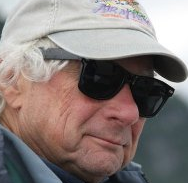U.S. Democracy's Designed to Be Wide Open; Our Way of Choosing Leaders Isn't
By Joe Rothstein
Editor, EINNews.com
Wisconsin Governor Scott Walker announced today that he is running for President. I know that because there’s a very long article about it that begins at the top of the fold of the New York Times. I’ve also heard about it endlessly on NPR’s Morning Edition, and it is certainly getting a lot of play on the wire services and TV and cable networks.
Not that Walker’s entry is surprising news. But the N.Y. Times particularly has a policy of featuring each candidate on its front page as he or she makes a formal announcement.
Well, not exactly everyone. Vermont Senator Bernie Sanders merited only page A21 when he announced. CBS gave him only a sentence as an afterthought on a two minute TV segment about Hillary Clinton. When the N.Y. Times finally did get around to acknowledging the large crowds Sanders is drawing, the paper was generally dismissive of what they meant. Here’s a segment from a May 31 Times article:
“Mr. Sanders’ policy prescriptions---including far higher taxes on the wealthy and deep military spending cuts---may eventually persuade Democrats that he is unelectable in a general election.”
The media monitoring newsletter FAIR notes that Gallup has been tracking attitudes about more taxes for “upper income people” since 1992, and that 18 polls in a row have reported that solid majorities of 60% or more consistently believe that the rich pay too little. So are we to now understand that Sanders’ advocacy of that majority position makes him unelectable while all the Republicans who propose lower taxes for the rich (favored by about 15%) remain quite electable?
Sanders’ crowds are hard for the media to ignore. Crowds are one metric that determines media coverage, along with money, poll numbers, outrageous comments and that undefinable thing that creates what’s known as “inside the beltway wisdom.”
So far former Maryland Governor Martin O’Malley doesn’t have any of that. What O’Malley does have is a growing inventory of seriously substantial policy prescriptions covering energy, jobs and reform of the student college loan program. None of this seems to have interested the media, and likely won’t, unless O’Malley can parlay his formidable organizational skills into a credible Iowa or New Hampshire showing or seduces a billionaire to underwrite his campaign.
There’s much wrong with the way we elect our public leaders, particularly the most important leader of all, the U.S. President. One of the most serious of those wrongs is how quickly and arbitrarily the media determines the narrow choice that ultimately will go to the voters.
In a few weeks (August 6, Cleveland) the Republican Party candidates will have their first televised debate. Fox News will broadcast that debate and select 10 candidates to participate based on recent polling data. That will omit nearly half of the current and prospective field.
In all there will be 12 Republican TV debates and it's unlikely that any candidate who is left out of them will be the Republican nominee. A small group of insiders will winnow down the choices. Next fall, if history is any guide, two candidates, one Republican, one Democrat, will debate for general election votes. No others need apply.
All of this means that the game is rigged for three categories of candidates: 1) Those with the most money to buy early poll numbers and crowds, 2) The most established political figures who can ride on name recognition, and 3) Those who make news through bizarre statements and behavior that the media can’t resist covering. There’s only the narrowest of windows for others.
Like Jill Stein, for instance. Jill Stein likely will be the Green Party candidate for president as she was in 2012 when she won half a million votes. She’s a medical doctor, a Harvard graduate, representing a political party that’s elected hundreds of candidates at the local government level.
The system also excludes the Libertarian Party candidate, whose nominee for President, former New Mexico Governor Gary Johnson, won more than a million votes in 2012. Former Salt Lake City Mayor Rocky Anderson, who formed the Justice Party a few years ago, is by all measures a serious and credible potential leader. You’re not likely to see his name or political party mentioned other than right here.
On the political left there are candidates from the Socialist Party and the Peace and Freedom Party. Both are well established movements, with tens of thousands of members and serous issue platforms. On the political right there are candidates from equally legitimate movements, the Conservative Party, the Constitution Party, the white supremacist American Freedom Party and others.
Democracy is based on citizen selection among competing voices, ideas and options. The system can’t possibly work right if the spectrum is prematurely limited.
The media seems quite surprised to learn that Bernie Sanders and Donald Trump each have strong followings. Open the window further and who knows what other surprises may be out there.
A blue ribbon group of former political and government leaders and even some media people wants to find out. They are lobbying to have admission into the 2016 presidential debates determined by signatures. Those who can collect 4 to 6 million names should be included, the group argues. That would represent a percentage of the potential presidential electorate higher than Ralph Nader received in 2000 as the Green Party nominee.
In addition to the 18 or so “major” Republicans who often get mentioned in the presidential hunt, 95 others have declared themselves candidates for president on the Republican side and 86 have announced for the Democratic Party nomination, according the website politics1.com. The outpouring of candidates is in keeping with America’s patented “anyone can be president” roots.
Most of the hundreds who say they are running for President are not serious, of course. But many are, and have content-rich web sites.
Like Benny Korman of New York, who seems determined, but realistic about his chances:
“I will first be running as a Republican, seeking the Republican Nomination. Then, depending on the outcome of the Republican Primary, I may continue my campaign and run as a Write-In candidate in the General Election, but I will cross that bridge when I come to it.”
And others are like Tiffani Mims of Texas whose web site has an open letter to all of us:
“Hello America, It's been a very long time, almost a year since I walked away and decided to pursue my ambitions to run for President. It's hard and it's hard work. What can I say when you have to pay for everything yourself, do everything yourself with a couple of dedicated friends to help out.”
American-style democracy. It was designed as a vibrant, unpredictable, but representative process, not the tedious slog it has become. What a great idea. Now we just need to change a few things to make it work right.
(Joe Rothstein can be contacted at joe@einnews.com)




